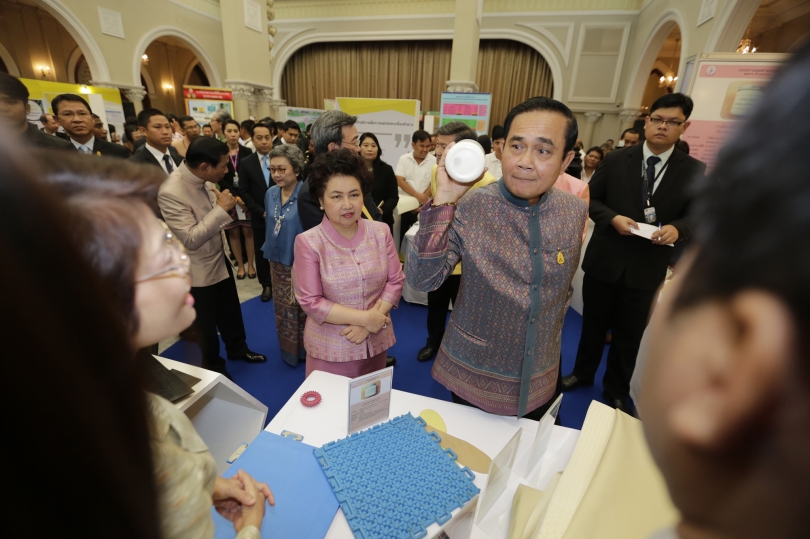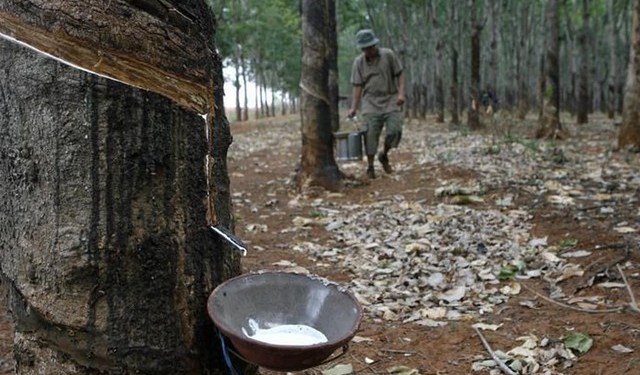THE GOVERNMENT will call for a meeting with related agencies, including the Finance Ministry, Bureau of the Budget, and Council of State, today to discuss the Bt4.5-billion budget allocated to help rubber farmers.

Cabinet backs purchase from farmers at BT45 per kilo as aid efforts stepped up.
Agriculture Minister General Chatchai Sarikalya said the Cabinet yesterday approved the measure proposed by the Ministry to use the budget to buy rubber directly from farmers for Bt45 per kilogram. The purchase would be conducted from January 25 onwards.
“We have not yet finalised the actual demand for rubber raised by individual ministries. However, we are trying to encourage all ministries to allocate their normal budget to support the rubber purchase domestically,” he said.
However, chairman of the Rubber Council of Thailand, Uthai Sonlaksab, was not enthusiastic about the plan. He said the government might not be helping the rubber price by contributing Bt4.5 billion to purchase 100,000 tonnes of rubber at Bt45 per kilogram.
He said the market price of rubber was increasing gradually and would go beyond the purchase price set by the government.
“We have seen the price of rubber increasing in the marketplace from the end of last month. The price of smoked natural rubber jumped significantly from Bt32 per kilogram to Bt39 due to less stock of rubber in the market and the end of the tapping season for rubber plants,” he said.
“What we want to see is the government encouraging the use of rubber domestically, which can be processed into many products for value added. This should be done under this NCPO-installed government. We need to accept that the lower price of rubber is not caused only by outside factors. Both Thai merchants and exporters have also dumped their rubber prices,” said Uthai.
Prime Minister Prayut Chan-o-cha yesterday opened Government House to be a meeting venue between eight government agencies and private companies manufacturing rubber products. The move will allow ministers to have initial discussions with the private sector in finding a solution for the purchase of rubber, in line with the government’s measure to assist rubber farmers. The rubber products being displayed by the government have been divided into seven major categories, rubber products for: tourism, for agriculture, transportation, military, medical and cosmetics, accommodation and consumer goods, and rubber products for industry.
He said that rubber product manufacturers needed to concentrate on product quality and competitive prices. Such activities would help raise the standard of rubber products in the domestic market, rather than importing similar products from neighbouring countries.
“I would like to urge the private sector to purchase rubber domestically. Rubber product manufacturers should also conduct surveys to find out the actual demand for rubber from government agencies, such as for military vehicles and machines so that they will be able to manufacture and supply the right products demanded by the government agencies,” said the Prime Minister.
“We need to check out the real volume of rubber demanded by local manufacturers. Similar measures should be launched as those that assist the rice farmers.
“With this measure, the rice farmers were urged to reduce their plantation area for rice from 30-35 million rais to about 25 million rais. Rubber farmers should be urged to do the same by reducing their plantation areas for rubber to be replaced by other plants,” said Prayut.
An exhibitor, Sitanon Amatawet from Prince of Songkla University’s Science Park, was also satisfied that some officers from Thai Industrial Standards Institute supported the park in enhancing innovation of its rubber medical and cosmetic products. The park also gained support from the Budget Bureau in registering its innovations, he said.
However, Sathaian Techapanyarak from Yong Thai Rubber Industrial said he was only half-half content with the exhibition “We’ve talked to officers from the Industry Ministry and Science and Technology and they supported us.”




























